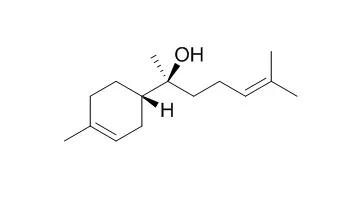| In vitro: |
| Archives of Oral Biology,2013,58(3):10-16. | | The antimicrobial activity of alpha-bisabolol and tea tree oil against Solobacterium moorei, a Gram-positive bacterium associated with halitosis.[Reference: WebLink] | To investigate the antimicrobial effect of alpha-Bisabolol and tea tree oil alone and in combination against the halitosis-associated Gram-positive bacillus Solobacterium moorei.
The inhibitory activity of alpha-Bisabolol and tea tree oil against the reference strain S. moorei CCUG39336 and four clinical S. moorei isolates was investigated by a direct exposure test. Additionally, the ability of alpha-Bisabolol to increase the sensitivity of S. moorei was tested by pretreating the bacteria with sublethal concentrations prior to the administration of tea tree oil.
A dose-dependent killing was observed for the antimicrobial agents in a direct exposure test with the reference strain S. moorei CCUG39336. Concentrations of ≥0.5% tea tree oil caused decreases in viability of >5 log colony forming units/ml even after short incubation periods, while bacterial viability was less affected by alpha-Bisabolol. The combination of 0.1% alpha-Bisabolol plus 0.05% tea tree oil showed a synergistic effect on S. moorei strain CCUG39336 and on two of the four clinical S. moorei isolates tested. However, incubation of S. moorei with a sublethal concentration of 0.1% alpha-Bisabolol for three days prior to the administration of 0.05% tea tree oil did not enhance the antibacterial effect of tea tree oil.
CONCLUSIONS:
Halitosis-associated bacterium S. moorei is susceptible to the antimicrobial agents tea tree oil and alpha-Bisabolol, suggesting that these compounds might be beneficial in oral healthcare products. | | Journal of Applied Phycology, 2016, 28(3):1987-1996. | | Alpha-bisabolol from brown macroalga Padina gymnospora mitigates biofilm formation and quorum sensing controlled virulence factor production in Serratia marcescens.[Reference: WebLink] | Biofilm formation, quorum sensing (QS)-regulated virulence and emergence of antibiotic resistance in bacterial pathogens lead to major health problems. In this perspective, antibiofilm agents and QS inhibitors have gained much attention to treat infections caused by antibiotic-resistant pathogens. For the first time, this investigation reports the antibiofilm and QS inhibitory potential of the brown macroalga Padina gymnospora against the nosocomial pathogen Serratia marcescens.
METHODS AND RESULTS:
The methanolic extract of P. gymnospora inhibited biofilm formation and the production of prodigiosin and protease. Successive solvent extraction, bioassay-guided fractionation of chloroform extract and GC-MS analysis of active fractions showed the presence of alpha-Bisabolol with a relative abundance of 69 %. In vitro assays with alpha-Bisabolol evidenced the potent inhibition of biofilm and QS-controlled prodigiosin, protease and swarming in S. marcescens, without exerting deleterious effect on its growth and metabolic activity.
CONCLUSIONS:
The results of this study exemplify the use of P. gymnospora and alpha-Bisabolol as promising alternatives to antibiotics. |
|






 Cell. 2018 Jan 11;172(1-2):249-261.e12. doi: 10.1016/j.cell.2017.12.019.IF=36.216(2019)
Cell. 2018 Jan 11;172(1-2):249-261.e12. doi: 10.1016/j.cell.2017.12.019.IF=36.216(2019) Cell Metab. 2020 Mar 3;31(3):534-548.e5. doi: 10.1016/j.cmet.2020.01.002.IF=22.415(2019)
Cell Metab. 2020 Mar 3;31(3):534-548.e5. doi: 10.1016/j.cmet.2020.01.002.IF=22.415(2019) Mol Cell. 2017 Nov 16;68(4):673-685.e6. doi: 10.1016/j.molcel.2017.10.022.IF=14.548(2019)
Mol Cell. 2017 Nov 16;68(4):673-685.e6. doi: 10.1016/j.molcel.2017.10.022.IF=14.548(2019)